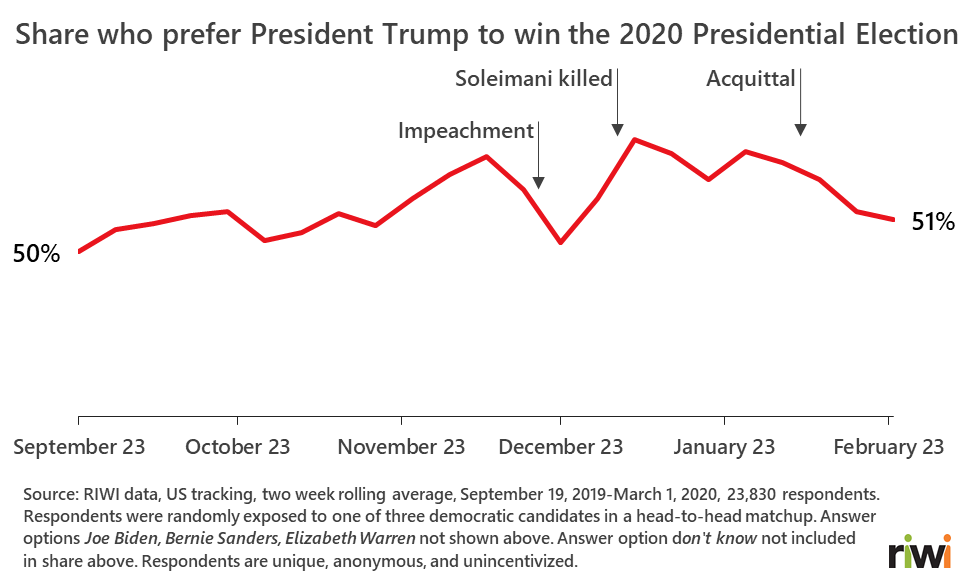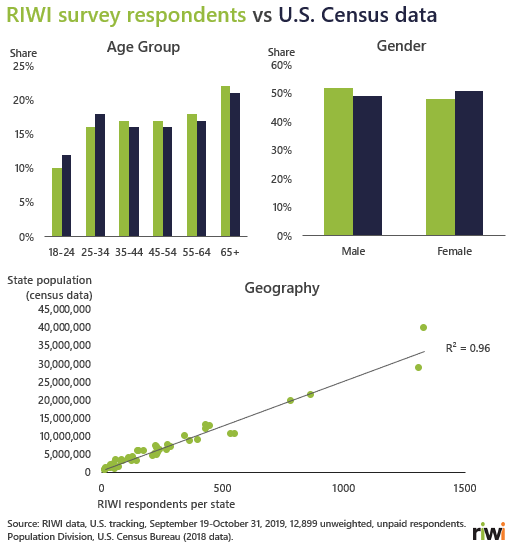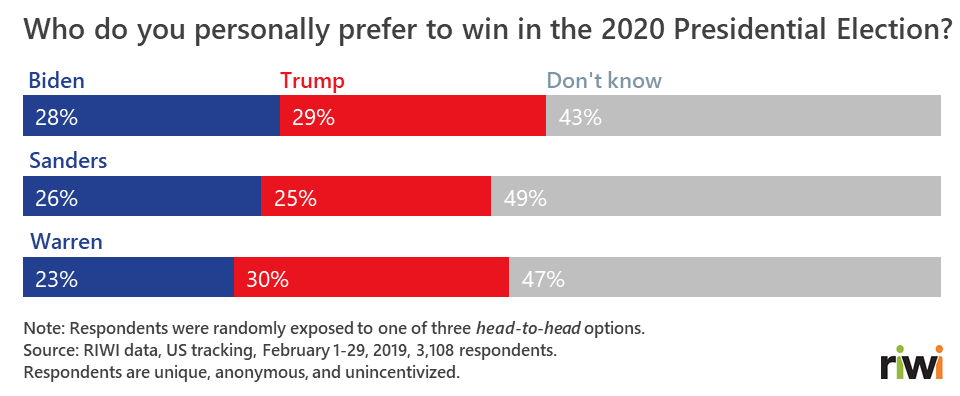By: Emily Kuzan
Support for President Trump returns to fall 2019 level

This month RIWI data show a drop in support for President Trump after his acquittal in the Senate impeachment trial, with support falling to 51 percent, subsequently returning to a similar level in RIWI’s fall 2019 data. We randomly exposed respondents to three head-to-head matchups1 (against Former Vice President Biden, Senator Sanders, and Senator Warren), consolidated the results and excluded don’t know responses to find the share of respondents who would prefer President Trump to win re-election in 2020.
The drop comes from the Northeastern, Southern and Western regions of the US; RIWI data show that support remained stable through February in the Midwest, a crucial swing voting region, at 54 percent.
In this study, RIWI’s unweighted survey data nearly match U.S. census data when comparing age, gender, and geographic distribution (as highlighted in our first monthly update).

The US 2020 election outcome is still unclear, say over 5,500 RIWI crowd predictors in February
| Regardless of whom you support, which party do you think will win your state in the 2020 Presidential election? | ||
| Democratic Party | Republican Party | Don’t know |
| 26% | 25% | 49% |
| Source: RIWI data, US tracking, February 1-29, 2020, 5,829 respondents. Respondents are unique, anonymous, and unincentivized. |
||
- Both academic and previous RIWI predictions show that asking who respondents think will win is more predictive than tallying individual preferences
- This month we see the Democratic party narrowly overtake the Republican party and the share of don’t know beginning to shrink
- Similarly, among those who believe it is worth their time to vote, don’t know has decreased to 26 percent, the lowest level we have seen to date. Among likely voters, the Democratic and Republican parties are currently tied at 37 percent
Senator Sanders is the only candidate who “wins” in a head-to-head matchup
This month former Vice President Biden returns as the Democratic candidate with the highest share of support in our head-to-head matchups. However, we see that Senator Sanders is the only candidate who received a higher share of votes than President Trump in a face-off, but it should be noted that this result comes with an increased proportion of don’t knows.

Mid-way through the month we added former New York City Mayor Michael Bloomberg to our head-to-head matchups and our early results show that in a face-off 24 percent of respondents prefer former Mayor Bloomberg, 28 percent President Trump, and 47 percent are undecided – placing Mr. Bloomberg ahead of Senator Warren.
About 2020 In-Focus: RIWI Predictive Election Tracker
RIWI’s election tracker is different than traditional methods because it:
- Uses RIWI-powered technology that accurately predicted the 2016 Presidential Election
- It is continuous and real-time
- It reflects both engaged and politically disengaged populations, in contrast to traditional polls which typically capture engaged, often paid, populations
- It reflects views anonymously, reducing social desirability bias
- It uses unincentivized respondents who are not on a ‘panel’ of habitual survey takers, receive no money or rewards-in-kind for participating in the survey, thus ensuring data quality, anonymity and compliance with privacy law.
Two of the “X-factors” that caused conventional polls to miss the 2016 election and that could manifest again in 2020 were 1) the underreflection of typically disengaged populations including those in the Midwest and 2) the “shy Trump voter” effect2. The RIWI patented methodology and technology platform addresses both X-factors.
From October 2019 to the November 2020 election, expect monthly updates on which party Americans think will win the Presidential Election, who Americans personally prefer to win the Presidential Election, and a new monthly insight depending on what the data reveal.
- Former Mayor Buttigieg and former Mayor Bloomberg were added to the head-to-head matchups in December and February, respectively, following increased media attention and polling numbers; we exclude the data from their matchups in this trend line to ensure the data are consistent over time. Former Mayor Buttigieg was removed from the matchups on March 1st, after dropping out of the race.
- Russonello, G. (2019, November 23). Four Problems With 2016 Trump Polling That Could Play Out Again in 2020. The New York Times. Retrieved from https://www.nytimes.com/2019/11/23/us/politics/2020-trump-presidential-polls.html
